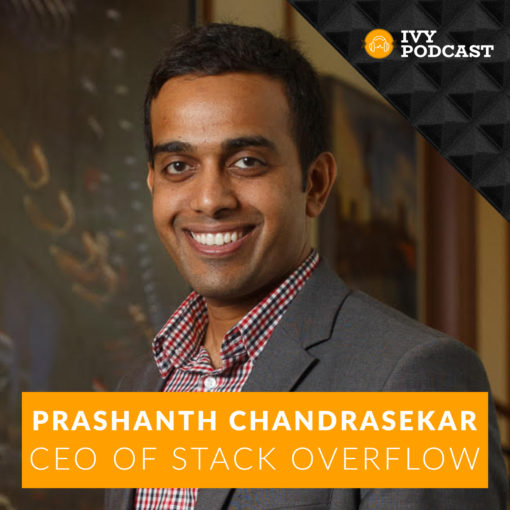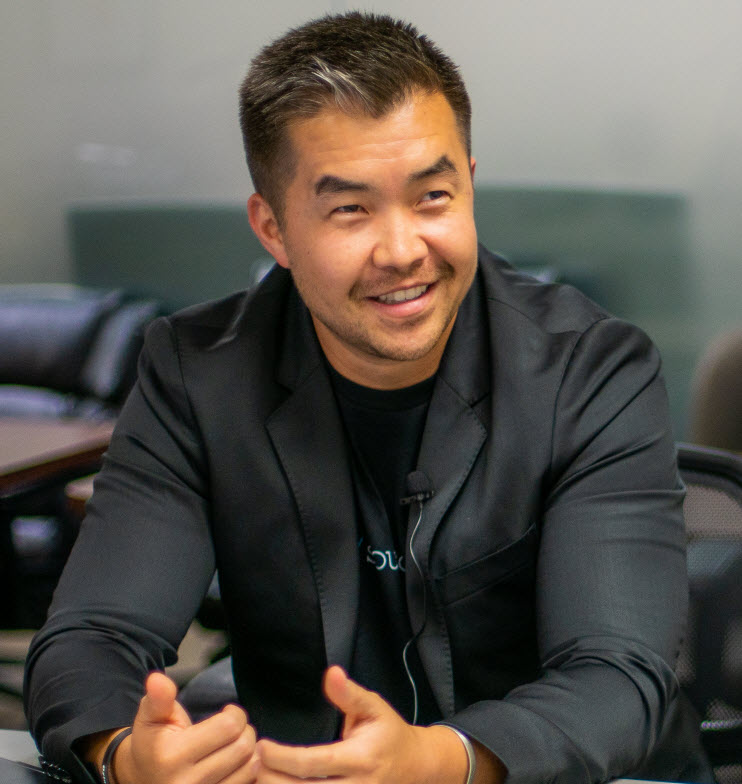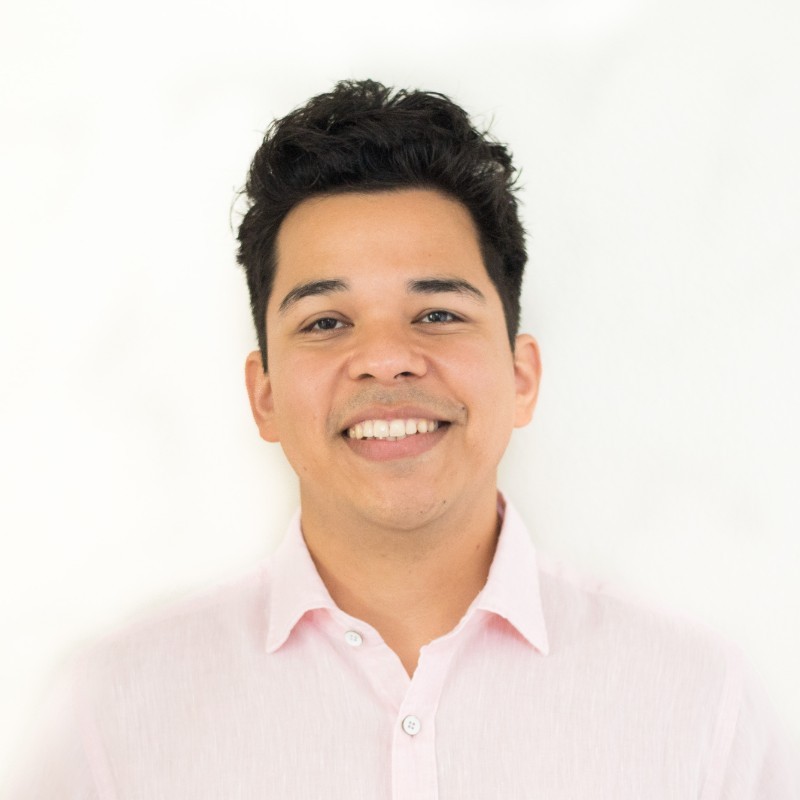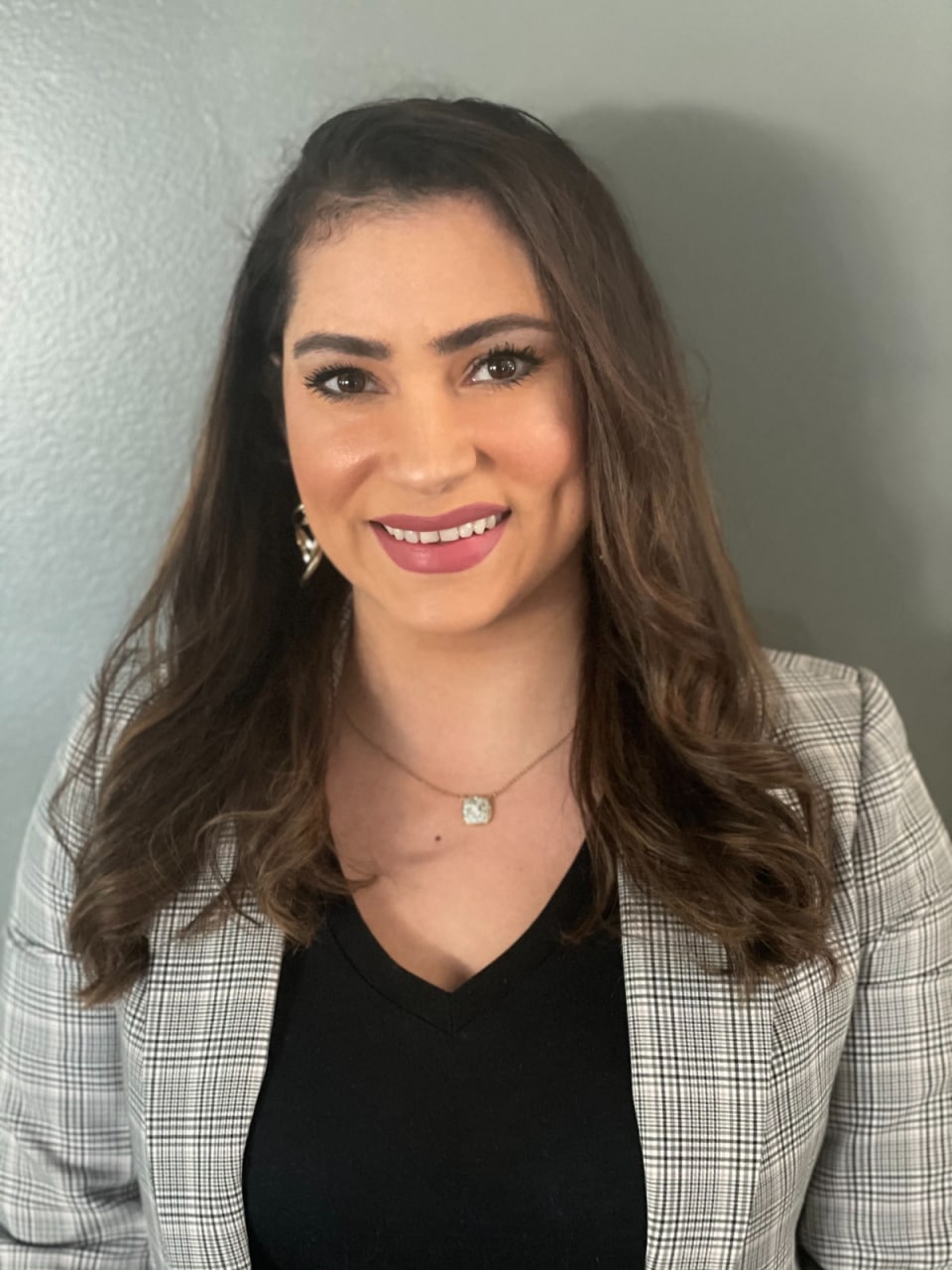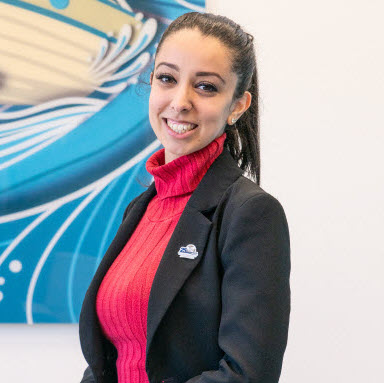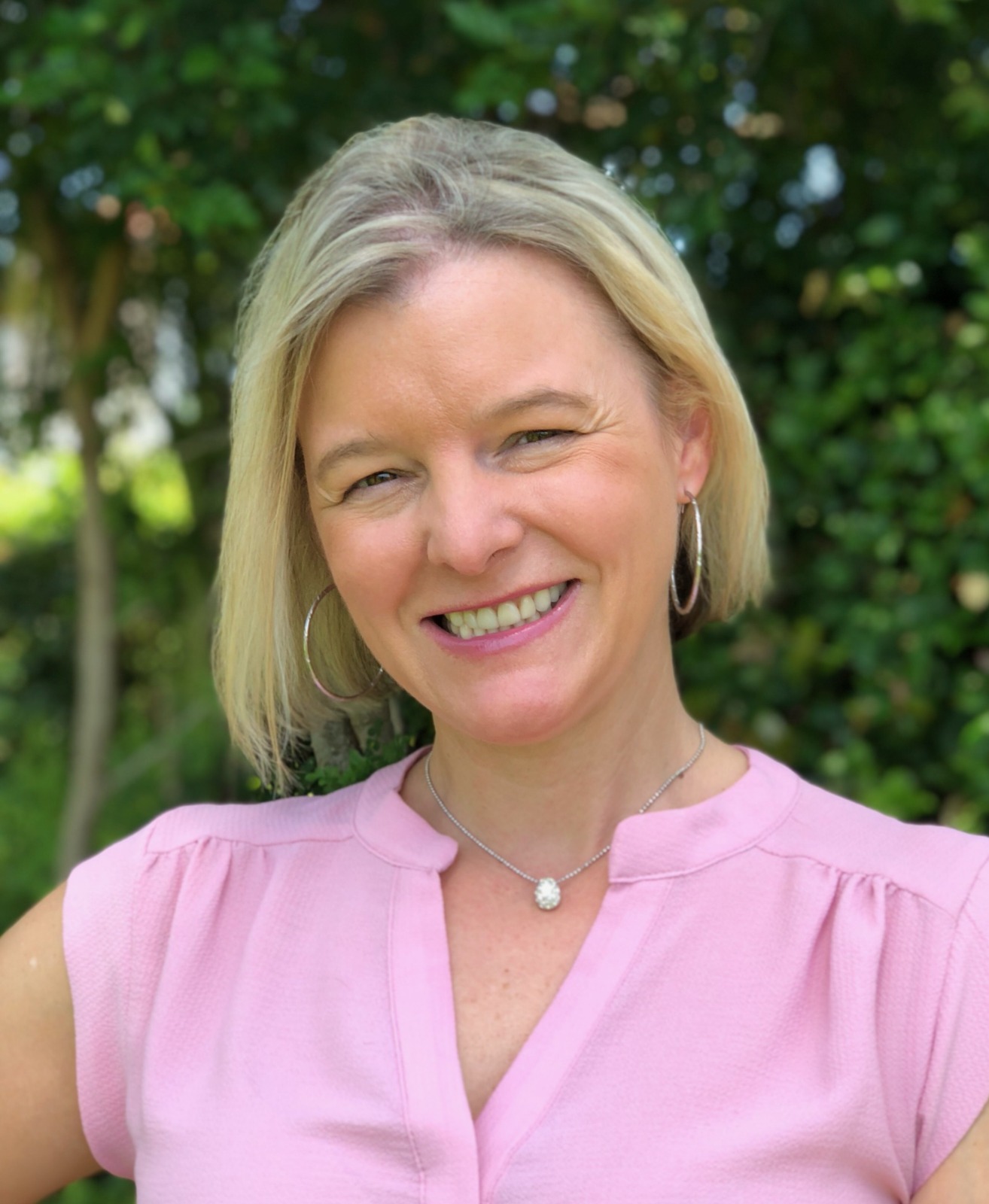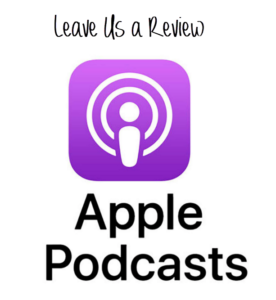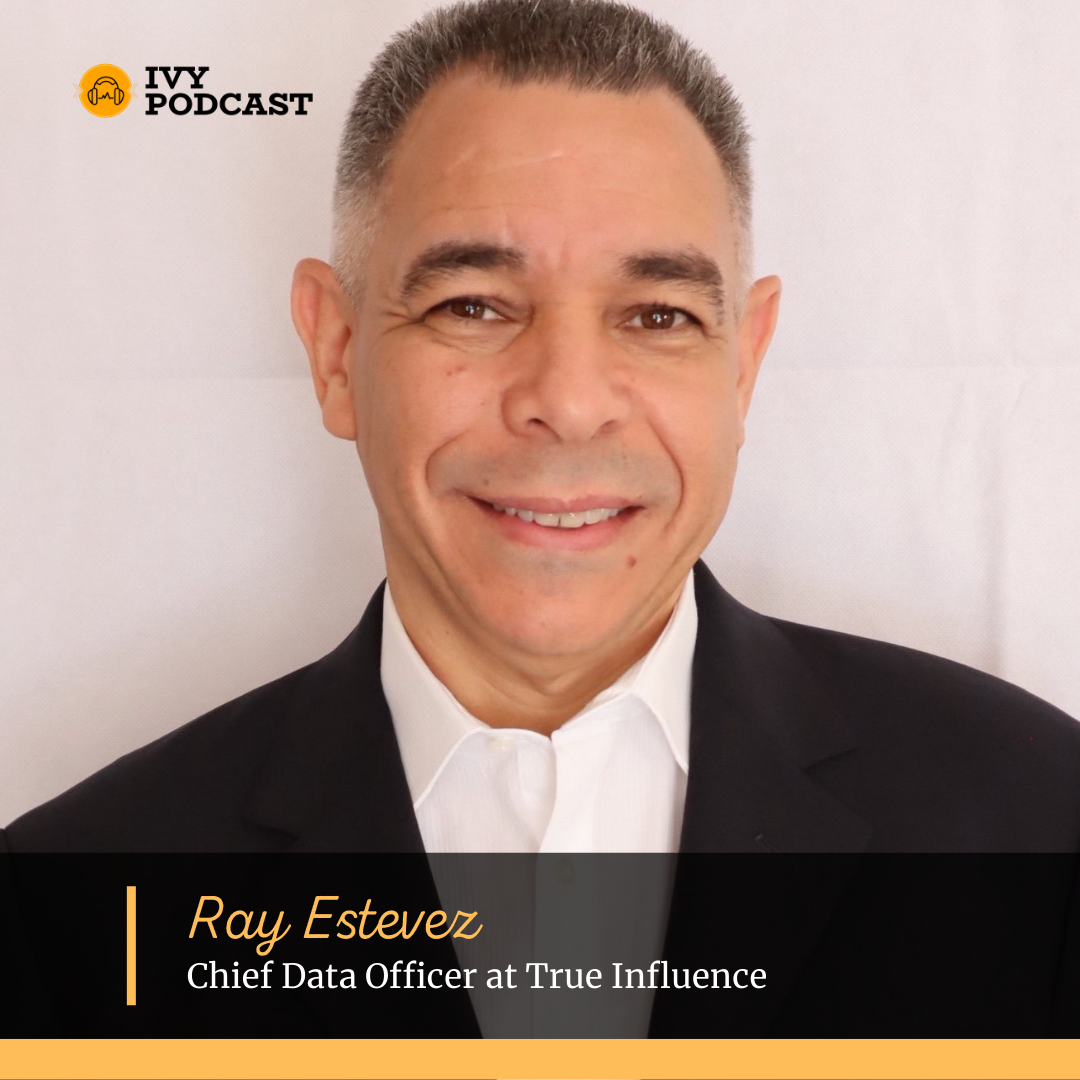
Ray’s journey to the C-Suite consists of successful enterprise and start-up experiences at JP Morgan, Time Warner, ConsumerNet, 24/7 Media, ORB, V12 Group, V12 Data, and True Influence.
Ray Estevez is the Chief Data Officer at True Influence. Estevez provides data and technology leadership for the continued development of an innovative, robust, and secure data and information technology environment throughout the organization. The primary responsibilities for this office encompass a wide variety of strategic data and technology issues: governance and policy, information technology protocols, and the True Influence Information Technology organization.
Previously Estevez was the co-founder and Chief Information Officer of V12 Group. Where he helped grow and develop the company until it was acquired by Datamentors in 2016. The combined company was rebranded V12 Data. He has 30 plus years of leadership experience in the fields of data management, information technology, and digital marketing.
As the CTO of ConsumerNet Estevez was instrumental in the development of their Email database technology and revenue growth. This led to the company being acquired by 24/7 Media Inc., for $52 million dollars (http://tinyurl.com/qylqopj). After executing a smooth integration of technologies and personnel, he went on to lead the technology and operations of the 24/7 Mail division. He was appointed an executive member of the 24/7 Media mergers & acquisitions team.
Estevez is a member of Forbes CIO Network, TECHLATINO, and serves on the Board of Advisors of Rebel Visions Corporation and NextVision Sales Institute. Ever an advocate for his team, he encourages education, open communication, and work-life balance. He is a mentor to several college students and prior colleagues that are now CEOs of their own companies.
[00:00:27] Ray Estevez: Hi, Jahn, thank you for inviting me for the podcast. My name is Ray Estevez and I am the chief data officer at true influence. They've been with the company for about two years now and I'm actually moving on to a chief information officer role. So my responsibilities are expanding, which is pretty, pretty cool. [00:00:45] Jahn Karsybaev: [00:00:45] Awesome, Ray, thanks so much for finding time to join us on the podcast. Perfect timing right? With the change in the role and responsibility, congrats on the promotion or whatever that is or changing responsibilities. Tell us a little bit more about, by your background, where you come from in your career path and then the one to spend some time talking about your current role. [00:01:07] Ray Estevez: [00:01:07] Sure. Well, I am a proud product of New York City's inner city school, public school systems. I went to public school, public university, and it just goes to show you that if you give an individual an opportunity, they really can Excel. I came from a very tough area in Manhattan, Harlem. I'm sure you've heard of Harlem New York and had a great upbringing. Tufts streets, but it made me tough, it made me want to succeed and achieve great things. So I stayed focused on school, got my degrees. And then just hustle my way through careers and promotions just by a lot of hard work. [00:01:54] Jahn Karsybaev: [00:01:54] Oh, that's exciting. I can definitely relate to the upbringing and the kind of the big city life as well. So that's great. Thanks for sharing that. As far as your current role and responsibilities, or the company in general, tell us a little bit more about that. What falls under your purview? What are the problems that you currently saw solving? What are the most exciting projects you have underway? [00:02:18] Ray Estevez: [00:02:18] Yeah. I started, like I said, about two years ago, I was brought in to help sort of expand the data practice within the organization. So I actually made a move, a pivot in my career at that time from a chief information officer, chief technology officer background, to more of a chief data officer focusing on the data side, both data science. They'd acquisition best practices, data governance, and really mature the organization and make it a leader in the B2B space for marketing data. So that's what I've been doing for the past two years. And just recently, they've reorganized the company. And they've added a bunch of other responsibilities just because of my background to me. And I'm being moved to chief information officer now and still responsible for the data, but now all of the systems in terms of infrastructure, compliance, privacy, security, high availability, all those great things that come with the technology side. In particular for me, the data challenge was a great, great experience. These last two years have been awesome because I came into an area where I heard and read a lot about data science and big data. I stayed abreast of change and technology, but had not really had a chance to fully put it to practice. And the last two years have been such a great experience. We process billions and billions of data signals that show intent of business contacts and businesses showing consuming business topics by visiting websites, searching, clicking on ads. And we take all of this data, process it and put it through this relevance engine that we build that basically tries to provide an intensity score of how is this person really injured, did in this topic, mostly around B2B, what are they searching? What are they consuming? What are they exploring? Are they in the market to make a purchase? And we surface that interface that we develop for our customers to find these leads and drive marketing campaigns, whether it's through digital ads, in terms of programmatic or email marketing, many different forms of marketing to reach these business contacts, if you will, in businesses that are showing intent. So it was completely different because I came from a consumer centric business prior to this, we targeted consumers who were looking for music and sports and just consumer driven purchases and interest. And B2B was not that big of a focus in my previous roles. So I had to completely learn a whole new industry in a whole new world. But it's been an incredible journey and I'm very, very excited to lead this group and to achieve what we've done in such a short period of time. [00:05:27] Jahn Karsybaev: [00:05:27] Wow. That's super exciting. And it sounds like a lot of challenges, but at the same time, very exciting projects you have underway.So that's great to hear. Yeah. And to take that a little bit further, you play different roles being responsible data. And now to taking more over umbrella role of the technology aspect of your organization being the CIO innovation, I'm pretty sure is, at the forefront for you as a strategy and building and fostering that culture of innovation, I'm pretty sure that's, you know, one of the main focus areas for you along the lines with everything that comes along with, from maintenance standpoint, tell us a little bit more about your strategies or insights and initiatives that really help you build and foster that culture innovation within your organization. [00:06:17] Ray Estevez: [00:06:17] Yeah. Great, great question. And for me, innovation, really, a lot of people confuse innovation with technology and it really is not technology to me. Innovation is people that are really thinking about a problem and making an improvement. Or solution to something that either doesn't exist or exists, but how to improve it and make our world around those better. So innovation is creative minds to look at something that exists or doesn't exist and help improve it without improvement.There is no innovation, right? And that's the way I look at things. That's the way I feel, I consider that without improving the process, they'll build something new. That's going to help the world around us. You can't call that innovation just because you apply faster technology or cool gadgets. That's not innovation, so that's kind of how I look at innovation in terms of strategies, I've tried to build even in my prior roles, but more so now, because I'm more on the business side, dealing with data and customers directly. How do we innovate? How do we improve? What we're delivering to the customer, the quality, the responsiveness of that data in terms of those campaigns, how do we increase their ROI? So not just the process itself or the technology tools, which are just a vehicle to drive that innovation, but what is the end result? How, have you made these clients happier or better or more successful because they're using your product or your data. And that's where I've basically have used my team to look at the data and really ask a lot of questions and model it and really try to say, what can we learn from these campaigns and these things that work or didn't work and teach these models, these AI models that we've developed. To provide and keep surfacing the better responding groups of target customers that you might market to. And that's really sort of a culture that I created in it to influence that basically says, listen, you got to look at the data, you got to challenge the data. You have to question the data and you have to validate it, or you have to make sure that the response is there. You can't just bring in all this raw data, try to format it. And yeah. Standardize it as structure and just say, I'm done. So to me, where innovation is really about how do you improve the business process of our marketers, the CML clients that are coming to us, that are trying to grow their businesses. And that to me is what makes this an exciting world for me technology is just a vehicle. It's just a tool. There are tools that help accomplish that, but training and educating and creating this data-driven culture within my company is what's allowed us to innovate and continue to grow even during COVID. I mean, think about what we just went through and we're still in it. Right, most companies were struggling and we just, we kept pushing forward. We accelerated it, we went faster. We challenged ourselves and our staff. So that to me is what innovation is. How do you improve the process even under these challenging conditions? Right? [00:09:46] Jahn Karsybaev: [00:09:46] Right. I love these examples. At the end of the day, it's not about some innovative new product that you had built from a technology standpoint. And it could be as simple as improvement in a process, like you said, it's all boils down to the overall outlook into innovation and that whole culture of experimentation almost empowering your folks, employees to fill, to be autonomous in the sense bringing ideas to life and also having the resources and time and allocation to experiment and bring, take action and actually try to bring that particular idea into action. So that's exciting. [00:10:24] Ray Estevez: [00:10:24] Yeah. Early on in my career. Just to add a little to that, I was one of these guys that really challenged the norm. If you remember, you are probably much younger than I am, but back in the days, you will not fail. If you selected IBM or Microsoft, now everything is open source, right? So about 15 years open source was just kind of a beginning and I adapted it. I learned it. I embraced it and brought it to my companies that I was involved with and helped those companies innovate and grow because I took chances and challenges. So it's like you said, it's technology is just a vehicle, but how do you apply it? How do you use it? How do you convince people that this is going to make things better and improve your world? And that's kinda how I started innovating. Early on by just looking at what was out there and applying it within my own world and how to improve my environment. [00:11:19] Jahn Karsybaev: [00:11:19] Right. Absolutely. That makes perfect sense. Thanks for sharing that. And we briefly touched upon different ideas to innovate ideas, to make things better from an overall standpoint of what are the different trends or ideas that really excite you these days? It doesn't necessarily have to be in your industry, but just overall, what are you super excited about? What is the next big thing? What are you researching? What are you looking to invest in or perhaps build, share with us some insights there? [00:11:47] Ray Estevez: [00:11:47] Sure, sure. Well, from an outside of my industry, obviously AI is the craze that's going on. Right? You see all these autonomous vehicles and flights into space and all these companies, exploding around us in terms of growth and investments. So, I'm just so excited that where my children and my grandchildren are going to live, what's that, we're all going to be like, it feels like it's almost right here right now. Getting almost tangible. I didn't think I would ever hear about any of these things. So I will have flying taxis over, and can take us somewhere. And that to me is what I see outside of my industry that really excites me. I read a lot. I follow these companies. I invest in these companies because, hey, if I believe in it, it may pay off from my personal investment perspective from our business side, in terms of my current role, it's really applying some of those challenges and innovations and ideas in the business side. Data and the use of AI and expanding and improving data science to come up with better models and better solutions for our customers and our platform. So I've spent a lot of time trying to figure out what are we doing? How can we do it better? Is there another enhanced cycle or model that we can use to produce even better results? So, pushing the envelope of how do you apply data science and types of data that you're bringing in to solve and improve your current business and your customers' results. So that's kind of how I spent a lot of my days constantly thinking about innovation from that perspective. And it's really on my side of the business, all around data, how much more data can I bring in what type of data can I enhance? And then what do I do with that data? How do you massage it and process it and create these models that can tell you something, some predictive analysis that might yield a great result for our customers. So that's kind of what. Gets my juices flowing excitement as I get to get up and go to work every day. So it's a lot of fun. [00:14:09] Jahn Karsybaev: [00:14:09] Yeah, no, I can definitely relate. And then a lot of the trends that you're talking about, definitely very exciting to me as well, from an advanced technologies perspective. Also from a standpoint of just anything that really kind of questions, the normal questions, the standard, the cryptocurrency, I'm very excited about that. Just being the overall kind of education learning component of that, just exiting from the overall standard, institutionalized education versus something a little bit, that's more practical. I think those are the different trends that I'm super pumped about. So definitely thank you for sharing those ideas with us. To shift gears a little bit. So with you being a technology executive, and when certain candidates join your guys' organization, they go through different rounds of interviews, technical assessments, all of that great stuff. When the candidate gets to you and you interview. Then give us a glimpse into an interview with Ray. What does that look like? Do you get creative with those? What types of questions you ask and more importantly, what are you looking for in some of the responses when you hear them? [00:15:22] Ray Estevez: [00:15:22] That's a great question. I don't do a lot of interviewing, honestly. I kind of have an introductory call. Normally my directors and VPs that work on my organization. They do the technical drill down. And I tell them, I don't want to see anyone unless they pass mustard on your side. And you feel like this is going to be a great candidate for this company. So we might start out with 20 candidates for one role. And I may interview two or three. If that normally, maybe just two. And then I kind of help them give them my insight, but I never make a decision. I don't hire anyone. I've always empowered my staff to make their decisions because they're the ones who are gonna lead those folks. They are the ones who have to work with them closely every day. So I give them that power. I say, listen to this, I can give you my opinion, but at the end of the day, you make your final decision. But what do I do in these interviews? Or sort of hello, introduction calls that I make with these folks that make it to my level is really to try and find how confident they are. Do they get rattled by challenge and crisis or the cool, calm and collective, can they handle a crisis and solve a problem? Not get, oh my God, all flustered. And I can't figure this out and kind of throw their hands up in the air. I look for that in a personality, right? Because the skill sets. They have a degree, a lot of them bring a lot of theoretical skills and knowledge to the table, but very little practical experience in real world challenges. So I'll ask a question about, tell me about some of the biggest problems you've faced in your role. And how you dealt with solving that and things like that I start picking personality traits on an individual to say, wow, this person is going to be super cool, super collective, and it's gonna be able to handle any situation that the business brings to the table, whether it's a crisis or just a question. And that's what lets me find, I think really high quality individuals. I have people in my organization that I've been working with for many, many years. There's a gentleman that works for me that I've sort of brought him wherever I go, because he's one of my right hand guys. And he's worked for me for almost 20 years. And to build that kind of rapport and a connection with someone is because you have to get. Give people power to make decisions. You can't micromanage. You got to let them grow and develop, and you'd be surprised how well they're going to surprise you and deliver. So that's something that I thrive in in terms of how do I grow my staff? How do I encourage them to lead and to nurture the younger, more junior folks that we hire into the pool? And I've only been here two years, but like I said, I have one person that's been with me for like 20 years. And he's with me in this new organization. And I rarely lose people because I work very hard to help them grow and give them a lot of rope either you're going to hang yourself or you're going to succeed. And I think most of them, because I picked them properly, they thrive. They just become successful. I have people that I still connect with that work with me in the past. They're currently CEOs of companies or CEOs or CTOs, and they were directors or VP of something in my organization at some point in the past. I love that. That shows I'm doing something right. These people are successful and I picked them. I brought them in, so it's great. [00:19:16] Jahn Karsybaev: [00:19:16] I love it. Well, that's super exciting. And that's just a testament to your leadership style in terms of really understanding the whole concept of leadership at the end of the day, that the more people you can help succeed, the more successful you are. And also what you've talked about from the interviewing standpoint, it's really empowering your team to make the decisions. And really when you actually, it sounds like when you interview folks, it's more of an opportunity for them to interview you and also ask the question. So, who's the leader? What type of culture within the organization am I the right fit for this type of group? I think that's super exciting, very simple, but oftentimes it's overlooked from a standpoint of kind of driving that and that's super exciting. Ray, from a standpoint of some of the most in demand skill sets or something that's very challenging for you guys to find these days as an organization,share with us some intel. From that standpoint, the reason I asked this is because a good portion of our listeners also are early stage career professionals, recent grads, and a lot of questions we also get is, hey, these conversations are great because it's practical, it's straight from the source. It's, there's no marketing fluff, but. Ask for gifts. What are the different areas where I should invest my time developing a particular skill set? [00:20:41] Ray Estevez: [00:20:41] Yeah, those are great questions and it really depends on what they want to do. Technology is so broad, right? There's so many angles and areas that one can follow. I sort of landed in management, just I think by accident, but it worked out great. So you have to. First search within yourself and determine what drives you. What motivates you? Do you want to be a practical hands-on engineer that solves some amazing products and, and, and create solutions and things like that. Then there's a different path in terms of what you should learn, what you should focus on. If you want to be a project leader, there's another path you want to be a manager at a high level, this a different type of way of thinking, but with answering your question in terms of what's in demand. I mean, right now it's all about data and data science. You see it all around, even all this AI stuff that we're talking about for the future, that's happening all around us. It's all driven by data. And the processing and handling of this data through all these models, which include machine learning, deep learning, natural language processing and LP. And just understanding how to use these skills in a practical manner will open and allow you to grow with where things are тow. You asked this question 10 years from now. It may be totally different, right. But in today's world, I mean, those are the biggest in demand, skill sets, anything around data, data science, and I'm talking about it. It's a big gamut of areas, right? It could be development where you need to be a programmer and develop and apply some of these models into a computer. Algorithms, whether you're using Python or AWE or C++, or there's so many options, but right now Python and R are the two leading development languages. You have to understand the concept of sequel, right? In terms of data analysis and extracting data and standardizing data and querying data and updating data and bringing structure to this unstructured world that we get all these feeds in. So, those are the areas that. If you really want to say what is really in demand. Those are the areas I think, in the data science field, anything with Python and R and sequel and development and those coding in those areas to help those things analytics in terms of modeling and advance querying of data and thinking of data and grouping it in certain ways, those types of skills. We'll make anyone extremely valuable and the money that's being thrown at these people is sick. It's crazy. I mean, I graduated with God, I'm giving my age away here, but I graduated in 1986 and I got my first job at JP Morgan in wall street. He was such an excited young kid and I think I was making $25k a year. So it was like, okay, that's a long time ago. And it seemed like a world. Now there's some kids coming out of college with barely no experience, just theoretical degrees and paper breaking that hundred thousand mark. It's insane. What's going on. Especially if they focus on a data science or real technical area. So, these skills that are in demand are very important. But besides that, it's the human element, right? Understanding, listening, people skills managing and engaging with teams. That's also a big demand. You look at a lot of managers that are hiring. They look for that because of the technical aspect. People are going to get better over time. The more they do the better they're going to become developers and analytics type folks, but there are certain skills that are harder to teach. And don't look for those things. So if you can focus on personal skills. To help you, whether you're going to go on a technical track and be a engineer hands-on all the time or a project manager or a leader that you want someday to be a VP or C X O of some type. Those other skills are just as valuable, if not more. The business side of things. So I look for all those things. And to me, that is, what's really in demand these days in a technical world, for me, what's hard to find you said are there things that are hard to find? Yeah, this is a shortage. We'd hear about it all the time. And there's such a push for teaching STEM, right. To folks in college and all these programs. And that is what we need to do. We need to increase the number of people that can work in these areas, because this is where the world is evolving to at least for the next 10-15 years. So the more people that can get into these fields and take these classes and these degrees, the better we're going to be. But right now it's a challenge. When I put in a job ad for data science. Even if it's an entry level or mid-level person, it takes us a while to find the right candidate. There's a lot of people who throw their resumes over, they took a class on you to me, and they think they're a data scientist. It doesn't work that way. So it is hard to find these people and there's a shortage out there. So I am a big supporter and proponent of people that I mentor too, if they want a career in technology and in this type of field to focus on these areas and become proficient, practical, not just book theory, but put it to practice the more and the more you learn and do the better you're going to be at what you do. [00:26:58] Jahn Karsybaev: [00:26:58] Right. Absolutely. I can totally relate with what you're talking about from data perspective, because for us at pro source, that's what we specialize in partnering with companies on very specific niche skill set from staffing and recruiting perspective from cloud data science, advanced technologies, cyber security, those four areas.We specialize in mainly because that's our practical expertise, but from what you're talking about, that being in demand and that being almost unicorn. Skillset where just the skillset alone technical expertise is not enough where it has to be combined with a set of soft skills that really make you as a well-rounded technologist, technically professional because technical skills, they evolve technologies, evolve all the time by your soft skills, your ability to elaborate, your emotional intelligence. Those are the things that also should not go unnoticed. And I love when you were talking about, from that standpoint, really also investing time into developing that side of you as a professional. I think it's super important. [00:28:06] Ray Estevez: [00:28:06] Absolutely. I think you hit it right on the nail there and the head of the nail, because a lot of people focus on the technical spot. I got this certification, I got this degree, I got this. But they don't know how to deal with conflict and those soft skills you just described, dealing with understanding what the client is really asking for. Listening. Listening is a very powerful skill. And these days to where you're talking, like everything being remote and virtual, those skills. [00:28:39] Jahn Karsybaev: [00:28:39] Exactly, exactly. Memorial of it. Yeah. That's right. I love that. That was great. Thanks for kind of give us insight from their perspective. When it comes to actually, you touched upon that being a big challenge, attracting that type of skills to your teams and so forth. What are the different strategies that really help you to find and attract that type of talent to your teams? Share with us anything that has worked well for you. Maybe there are some of the things to avoid. [00:29:12] Ray Estevez: [00:29:12] Sure. Yeah, right now I'm in a good spot. And the reason is I'm at a great company that offers a lot of benefits and great stuff. So it makes that part of the decision-making of attracting people easier. Right. So, the company offers 100% free medical benefits. You don't contribute a penny to it 401k matching, where they're actually matching some of your following 401k contributions. I think it's like that, right? Continuous training. We invest so much money and energy on training through LinkedIn, other sorts of groups of training, external training, whatever it takes to advance these people. So, that portion makes it easier? When I have those conversations with folks who might be looking at our company, because it opens a door that there's no objection. Oh, well, this company doesn't pay well, they don't have good benefits or they don't do training. So that makes it a much easier conversation. The next thing is, it's really about personality, right? You have to have a culture and you have to feel like you fit into that culture. So I work very hard with my staff because they do most of the interviewing. They do most of the initial screening. They are the ones who narrow it down to those top two or three candidates that might come on board. So how do you make them feel like, oh my God, this is the company that I would like to be part of as they're growing. They offer great benefits, this advancement potential, there's learning potential here. Even if it's just for two years of my journey, it could be the most amazing two years that I've had so far. So making that environment appealing and attractive to them, I think, helps us attract candidates. When we put up an ad on LinkedIn or on our website, we get inundated with resumes and maybe. Because there's a lot of people who've lost jobs because of COVID. There may be more people. So, sometimes we have to spend a lot of effort trying to convince the really good ones that we are the right organization for them, that we are the right team, the right culture, where they are going to Excel and grow and develop their journey of where they want to get to. So, it is a challenge. It's not easy. I guess I'm lucky right now because I'm working for a pretty good company that offers a lot of great things that makes that part a little easier. Sometimes you get some candidates that they're very clear on what they want to do. And I always ask these questions sometimes about goals and what do you want to do? Short-term or long-term right in that introductory, just to get a sense of, is this someone who just wants to be a manager and a VP by tomorrow, or someone who wants to contribute to this company and evolve as an individual and grow. And those are the types of things that I get into to understand some people come in with a chip on their shoulder because they think they're that good and that they should be in your seat. As the CDO or CTO by next year. And some people tell me, I want your job by next year. And they're applying for a manager's job or even a senior engineer's job. And I'm like, well, I pay my dues to get here. I've been at this for a long time. So I don't think it's that easy. I mean, some there's some exceptional rockstars out there, but most of them that you notice. The way they get there. It's because they start their own thing. If you do it through the journey of a corporate environment, you still have to pay your dues. You're not going to go from graduating college with your bachelor's or master's degree. And two years later expect to be the CIO, a CTO or CEO of a company that's maybe making a hundred million dollars a year without paying some dues and really innovating. Right? So, that's what I try to find those that are realistic in their vision of their journey. And then I try to embrace them, I can help you get there. Let me show you how I can get you there. Tell me what you want. If it's realistic and achievable within this culture within this organization, I'll show you the way. But if it's not it's okay, good luck. This is not the right fit for us. Right. And that's, you have to find those, identify those differences and then make decisions off of that. [00:33:58] Jahn Karsybaev: [00:33:58] Absolutely. No, I love those examples and the personal perspective, it definitely makes sense. It's at the end of the day, it also boils down to the type of culture that you foster within the organization. And for a lot of my clients that we've had relationships for many years, it's really for, yes internally, we are recruiting. That definitely makes sense. But for us to come in and also help an organization, I think number one, investment that we make is to really first understand the type of culture that's in place. Because as we said, start sourcing and interviewing candidates, it's usually an immediate yes, no assessment is this going to be the right fit? Is this they're going to be the right personality match and so forth. So I think that definitely makes sense from what you're talking about being very surgical and also providing the candidates an opportunity to interview you as well. [00:34:54] Jahn Karsybaev: [00:34:54] That's very exciting. Very important. Absolutely. So for you personally, for your sources of information, your sources of learning, share with us any interesting articles, blogs, websites they use subscribed to what are your sources for continuous self-improvement, tell us a little bit about that. [00:35:19] Ray Estevez: [00:35:19] I am a learner, I'm always researching and trying to stay ahead of the curve, because as you said earlier technology is just constantly changing and evolving, so you can't stay still. Right? One of the sites that I've used and I discovered it a few years ago and I love, and they're doing a great job. With universities to help people advance and get degrees, even while they're still working, the world has changed. Right? And this is what I call about. This is what innovation is. How do you make education easier, better, more accessible, and more reasonably priced. So there's a site called edx.org. I discovered the site like three years ago. I love it. I still use it. It's critical to my organization, the last two organizations that I've been in, and I'm actually right now starting to try and work towards my masters. Ah, and you say, Oh crap, great estimates. Doesn't have a masters. That's right. While I was at JP Morgan, I just devoted my life and time to the company. I started my master's degree at Pace University down the Wall Street at Sidetrack, got married early in life, my career got in the way. And I started succeeding. Never finished it. It's one of those things you regret in life. Not because it didn't help me succeed. I've been very successful. But it's just a personal achievement and growth. So, now they have these micro programs and things you could do slowly, gradually towards, you can put it all together and get that achievement. Even if I'm 65 years old, Jahn, I'm going to invite you to my party to say, Hey, I'm celebrating my master's degree because that's one of my goals and dreams too, to still finish. Jahn Karsybaev: Right. I love that. Ray Estevez: And it's one of those things that this site can help many people, even in inner cities with low income that can start building skill sets and degrees or certificates to help them land those jobs, to improve their lives, their families, and move forward. And it doesn't matter where in the world, right. Because the internet is so powerful now. So, that's one area that from an education I use a lot and I leverage it at all my companies. And a lot of my staff use it to advance their skillset or learn new things. There's other sites like Kaggle, Data Science, Central, which are areas that I'm always following and reading their blogs and posting great papers by some great people, and another one called code mentor that I've used and visited occasionally. So, those are some of the areas where, and they're all around data science and AI, because that's where I spend a lot of my time learning and reading. So, but there's others, there're so many great resources out there, but for me, those are the few that I subscribe to and use for learning. [00:38:29] Jahn Karsybaev: [00:38:29] No, I love that. Thanks for those examples. And we'll make those links available in the episode notes for all of our listeners. Ray, last but not least, tell us what are you currently reading and what is one book that you always recommend to others and why? [00:38:45] Ray Estevez: [00:38:45] Yeah, I'm actually right now finishing this book called Learning to Love Data Science and it's by this author named Mike Barlow. It is put together in a way that breaks it down from more of a theoretical high level perspective. Not trying to say that you're going to become a data scientist, but to understand the concepts of what encompasses data science. So this is one book that I am in right now, like three quarters of the way done. And I just can't put it down. I love this book and I highly recommend it. And it is just for those who might want to pursue a career in data science or data, anything around data and technology from a data perspective, I recommend and hope that it inspires them to want to pursue that if that's what they want. Oh, they may read it and say, what? This is not really what I want to do, which is falling to you to find your passion. Once you find that passion, everything just. Kind of comes into play and falls right there and your path is kind of clear to you. So, there's a lot of books. I mean, there's a lot of personal books that I've read that I can't even think of the names and authors right now. I apologize. [00:40:08] Jahn Karsybaev: [00:40:08] Oh, no, it's all good. I love the recommendation then, definitely if you think of something and send it to me, we'll include that with a publication as well. Ray, thank you enough for your time today. It was such a great and insightful conversation. Definitely going to stay in touch with you, do another episode and about a year to see how much have transpired, how many more CEOs that you have produced and much appreciated all of the insights you shared with us. [00:40:35] Ray Estevez: [00:40:35] Absolutely, that'd be fun. I will actually send you a list of some of my colleagues and friends and folks that I've very close to, that I've helped to evolve. It may open up more candidates for you to kind of consider in the future for some of your podcasts. And like I said, some are CEO, some are CTO, some are different roles, but it's pretty cool. You could kind of get a sense of how their careers evolve and maybe tie it together and say, Hey, you remember Ray, how he helped you in your path? So that'd be cool. [00:41:09] Jahn Karsybaev: [00:41:09] Wait for that. And I love those recommendations. Usually those are the best episodes, like with Maribel recommending you. It's a super exciting, so definitely much appreciate all the insights. [00:41:20] Ray Estevez: [00:41:20] Awesome. Well, Janh, thank you so much for the time. This was a lot of fun. I like talking about my past and the sense of how I can help the youth and the folks that are looking for some guidance in terms of this industry. So, you could always share my profile on LinkedIn and anyone who wants to reach out and connect with me. I'm open to guide them and answer any questions they may have.
Welcome to Ivy Podcast! On this Executive Leadership Podcast we interview top executives from Fortune 500 with a focus on strategy, innovation, negotiation and everything about leadership.
Our Podcast for Executives features Thought Leaders who share practical insights for effective leadership, continuous innovation and strategy execution.
Ivy Podcast is a rapidly growing Executive Podcast, which covers topics like Hiring and Retention Strategies, Talent Acquisition, Innovation, Digital Transformation and much more.
On this Leadership Podcast, you will find conversations with the most accomplished executives from Fortune 100 companies. We aim to cover a broad range of industries and create a learning platform for the most ambitious and high potential professionals who are looking to learn from the most accomplished Executives on this Business Leadership Podcast.






